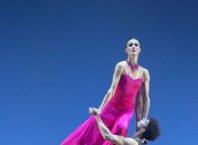
The Israel Festival is entering its Jubilee year in style, with a bevy of internationally acclaimed performers; the return of Israeli and international artists such as Ohad Naharin and the Batsheva Dance Company, Dame Kiri Te Kanawa, Ahinoam Nini and Clipa Theatre; and the thrill of a once in a lifetime experience: the Merce Cunningham legacy tour. The festival will take place from May 23, 2011 – June 18, 2011 in Jerusalem, with additional performances in Modi’in, Dimona, Holon, towns in the north and south of Israel and select Israeli historic sites.
Festival Director Yossi Tal-Gan announced that Ohad Naharin, who opened the 1993 festival with the premiere of Anaphase – a landmark work in Israeli dance history, will premiere a new work in this year’s festival. Although it is as yet untitled, Tal-Gan reported that in a phone call with Naharin, the choreographer said, “You can tell them that the temporary name is Sadot (Hebrew: fields).” Naharin’s talent for coming up with intriguing names for his works is as inventive as his choreography, and whether ultimately, the title will be Sadot or perhaps something else, it will no doubt generate vivid images and associations in connection with the dance.
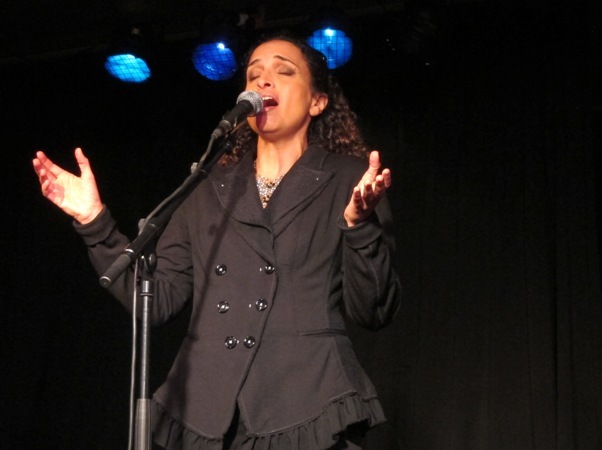
Jerusalem is the heart of the Israel Festival, but today’s press meeting took place at the Shablul Jazz Club in Tel Aviv, for a preview of the exciting musical encounter of Ahinoam Nini and Gil Dor, with saxophonist and composer Eli Degibri. Nini and Dor performed Rachel & Leah at the festival twenty years ago, and will now premiere a project of new arrangements to Israeli songs that have become classics. This performance will also be broadcast on the Mezzo channel. Eli Degibri will launch his new album at the festival, performing with Gary Versace and Obed Calvaire. Degibri, Dor and Ahinoam Nini performed together for the first time this morning, with a song from Dor and Nini’s forthcoming album – Ruach Stav (Autumn Wind, lyrics: Yehiel (Ali) Mohar, music: Yohanan Zarai), and Degibri’s Spanish version of Cole Porter’s Every Time We Say Goodbye.
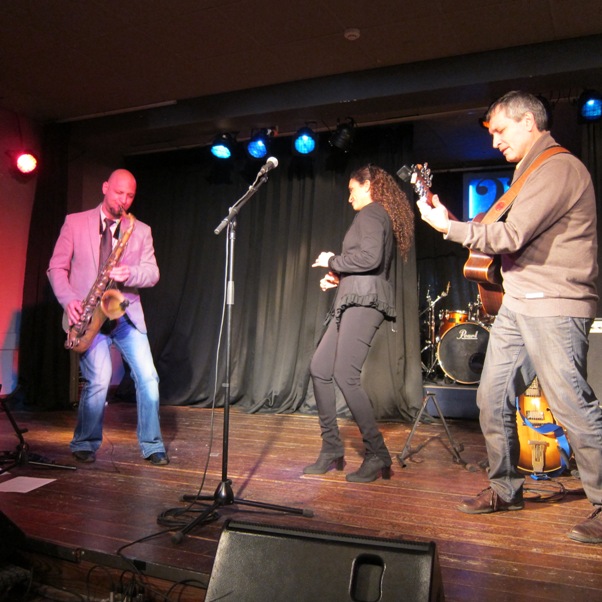
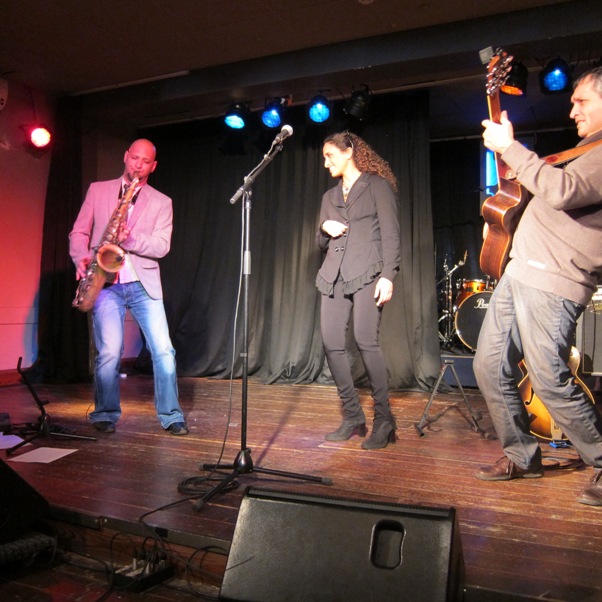
The three musicians cast an enchantment over the room that words and even pictures can’t quite convey. Tal-Gan said, “These [collaborations] are the most beautiful moments in our work.” When the festival director went on to tell the “behind the scenes” story of his initial cautious approach to the artists, treading carefully to avoid stepping on toes or bruising egos, saying, “You know that artists have huge egos.” [after all, one can imagine the difficulties: who gets asked first, what if someone says no, and other possible complications], Ahinoam Nini jumped back up onstage and said, “That’s not true at all. Any artist who loves her work, who creates leshem shamayim [Hebrew: for the sake of heavens, or in other words – art for art’s sake] would leap at the opportunity…would say thank you!” And indeed, as Tal-Gan reported, when he approached Ahinoam Nini’s manager with the proposal, the response was, “She’ll be delighted.”
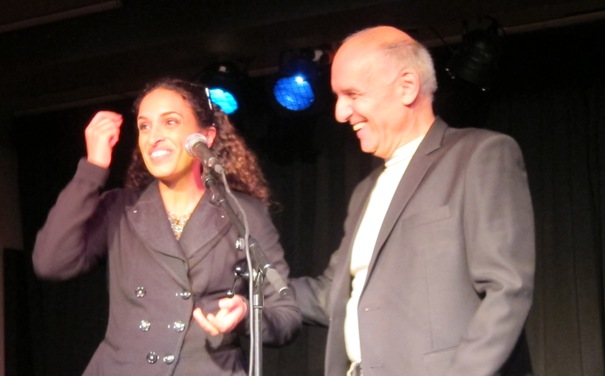
The Jubilee festival will celebrate two centennials: former Jerusalem mayor Teddy Kollek (who initiated Jerusalem’s adoption of the Israel festival in 1982) celebrates his 100th birthday, and the 100th anniversary of the death of composer Gustav Mahler will be marked with a marathon performed and directed by Gil Shohat.
Choreographer Merce Cunningham, one of the influential forces in American avant garde, created a meticulously planned program for the preservation of his work with the creation of the Merce Cunningham Foundation, where future generations will be able to study his choreography through video documentation, and a fitting closure for his dance company with the legacy tour. After two year world wide tour performing Cunningham’s works, the Merce Cunningham Dance Company will disband. The Israel Festival in cooperation with the Jerusalem Season of Culture (JSOC) will host a single performance at the Sherover Theatre, with Split Sides and Sounddance on the program, and several Cunningham “Events” at the Israel Museum – site-specific dances created in interaction with the museum space.
The Danish Dance Theatre will present a world premiere of Love Songs by British choreographer Tim Rushton, as well as a second program of three works. Israeli choreographer Nimrod Fried and composer Israel Breit will premiere La, a work for four singers and three dancers. The Vertigo Dance Company and Hora Jerusalem will participate in a giant Jubilee happening at Sacker Park alongside Hadag Nahash, Rita, David Daor and the Jerusalem Symphony, and the Israeli Ballet will present an outdoor performance in Kikar Safra.
The Schaubühne Berlin Theatre – Germany production of Shakespeare’s Hamlet, translated by Marius Von Mayenburg, directed by Thomas Ostermeir will be performed at the festival. Critically acclaimed, Moshe Kepten, the new Artistic Director of the Israel Festival said that he selected this production for “the director’s unusual interpretation of Hamlet. It is performed by a cast of only six actors; it’s a very contemporary interpretation with a rich stage dynamic. I was amazed.” The play will be performed in German, with Hebrew translation. The play is produced in cooperation with the Hellene Festival in Athens, the Avignon Festival and Habimah Theatre.
The Vakhtangov Theatre, a leading theatre in Russia, will perform their production of Chekhov’s Uncle Vanya, directed by Rimas Tuminas. The role of Vanya is played by Russian star of stage and screen, Sergei Makovetsky, and the play was awarded the prestigious Golden Mask prize and is participating in the Israel Festival in cooperation with the Golden Mask festival and Gesher Theatre, currently celebrating 20 years to its establishment.
Several Israeli theatre works will premiere in the festival. Clipa Theatre, which has created 5 theatre works for the Israel Festival since 1998, will premiere HaMitzpeh – an experimental, sensual work which begins with the audience seated or lying on a cushioned floor in utter darkness, surrounded by sounds emanating from all sides. Shahar Pinkas and Shir Goldberg will present My Father is Not a Bird, an adaptation of Bruno Schultz’s Cinnamon Shops. Director Yagil Eliraz and composer Ido Aharoni have created an operatic version of the Greek tragedy Oedipus Rex, called Oedipus 2011; that will include five actors and five singers, as well as nine musicians. The production is created in collaboration with the Jerusalem Theatre Company.
Musical highlights include the return of Dame Kiri Te Kanawa. The New Zealand born soprano, beloved worldwide, will present one performance at the Jerusalem International Convention Center (ICC) in honor of the Israel Festival Jubilee. Virtuoso pianist Hiromi Uehara, whose wide-ranging repertoire runs from rock to classical and jazz, will present a solo piano concert.
The full program will be available soon and further updates will be coming in the next couple of months, but the festival’s internet site will be launched on February 16, 2011 and tickets can be pre-ordered (at a discount) online.





